March 2018: Olive Tree

Volume II/Issue 23/March 2018


From The Editorial Desk:
Faithfulness at Home and Work
Jesus is our Example in all things. The Father had arranged for Jesus to spend the first thirty years of His earthly life in two places basically - His home and His place of work (the carpentry shop). It was Jesus' faithfulness in these two places that brought forth the approval of the Father. This is a matter of great encouragement for us, for we all find ourselves in these two places constantly - our home and our place of work. And it is in these two places basically that God tests us.
Jesus' home was a poor home. Joseph and Mary were so poor that they could not even afford to offer a lamb as a burnt offering. The Law had commanded that "if she cannot afford a lamb, then she shall take two turtledoves or two young pigeons......"(Leviticus 12:8). And Joseph and Mary took "according to what was said in the Law of the Lord, 'a pair of turtledoves, or two young pigeons'." (Luke.2:24). Jesus had at least six cousins (or some think that they were His step brothers and sisters). Mark 6:3 tells us that the people of his home-town remarked concerning Jesus, "Is not this the carpenter, the son of Mary, the brother of James, and Joseph, and Jude, and Simon? are not also his sisters here with us? And they were scandalized in regard of him?" If they were His step siblings, one can imagine the pressures and struggles that Jesus faced as He grew up in that poor home. To top it all, his younger brothers were unbelievers. It is written that, "neither did his brethren believe in him." (John. 7:5). They may have taunted Him in many ways. Based on archeology and history from that time period He may not have had any privacy in his house to retreat to, when facing the pressure of temptation from others in the house. There must have been the fighting and the squabbling and the scolding and the selfishness (common to all homes) in that home too. And amid such circumstances, Jesus was tempted in all points as we are; and He never sinned even once in deed, word, thought, attitude or motive or in any other way.
If Jesus had come in some different form than us, in some flesh that was incapable of being tempted, then there would have been no virtue in his living in purity in such circumstances. But He was made like us in all things. The Word of God says, "It behoved him in all things to be made like unto his brethren, that he might become a merciful and faithful priest before God, that he might be a propitiation (an appeasing) for the sins of the people." (Hebrews 2:17). He has undergone the pressure of every temptation that we can ever face. This is what gives us great encouragement in the moments when we are tempted, that we too can overcome. This is the hope that Satan seeks to rob us of, by trying to hide from us this glorious truth that Christ came in our flesh and was tempted exactly as we are.
As a carpenter in Nazareth, Jesus must have faced the temptations that all who engage in any form of business face. But He would never deceive anyone to whom He sold anything. He would never demand too much for any article and He would never compromise on any point of righteousness, whatever the cost (or loss) to Him may have been. He was not in competition with the other carpenters in Nazareth. He only worked to earn His living. Thus, through buying and selling and the handling of money (as a carpenter), Jesus faced all the temptations that we face in the area of money. And He overcame.
Jesus lived in submission to an imperfect step father for so many years. I am not saying that Joseph was not a good father to Jesus, I think he was one of the best fathers that the world had ever seen. But he was still human. And he was still part of a fallen world. Because of this this Jesus must have been exposed sometimes to various forms of inward temptations (in the realm of attitudes); and yet He never sinned. Joseph, I am sure, made some mistakes in raising Jesus at times. The best of dads do. Yet because Jesus was living in perfect victory, He never despised Joseph. If He had, He would have sinned. He respected Him, even though He and Mary was far purer than him. There we see the beauty of His humility.
Thus we see, that far from living an uneventful life during those thirty years in Nazareth, Jesus was in the midst of a conflict against temptation all the time - a conflict that increased in intensity as each year went by - for the Father had to take the Captain of our salvation through the entire range of temptations possible to human beings, before He could become our Saviour and our High Priest. God's Word says, "It was fitting for Him, for whom are all things, and through whom are all things made, in bringing many sons to glory, to perfect the author of their salvation through sufferings."(Hebrews 2:10 paraphrased). There were still a few temptations that Jesus would face in the last three and a half years of His earthly life. But the common temptations that we all face at home and in our place of work, He had encountered and overcome in the first thirty years. And the Father gave Jesus His certificate of approval at His baptism. If only our eyes were opened to see the basis on which God gives us His approval, it would revolutionize our lives totally. No longer would any of us covet a Hollywood lifestyle but rather faithfulness in the moments of temptation in daily life. We would stop admiring worldly celebrities and start admiring transformed lives. Thus our minds would be renewed to have our priorities right. What a tremendous encouragement this is, to know that God's greatest rewards and His highest commendations are reserved for those who face temptation with the same attitude that Jesus faced it - that is: "I would rather die than commit a sin or disobey My Father at even one point." This is the meaning of the exhortation in Philippians 2:5-8, which says, "For let this mind be in you, which was also in Christ Jesus: Who being in the form of God, thought it not robbery to be equal with God: But emptied himself, taking the form of a servant, being made in the likeness of men, and in habit found as a man. He humbled himself, becoming obedient unto death, even to the death of the cross."
Thus all of us have the same opportunity to be overcomers and to be among the called, chosen and faithful, irrespective of our gift or our ministry, and irrespective of our sex or our age.

Preparing for Baptism 2018
Most of us were baptized many years ago and many shortly after we were born. Just as Lent is a preparation for Easter for the baptized, it is also the preparation for Baptism by catechumens, who are converting to the Faith. Although not yet bound by the laws of fasting and abstinence, the catechumens observed the Lenten fast alongside the faithful, they soon hoped to join in holy Baptism on Holy Saturday. To this day, the Baptismal water is blessed on Holy Saturday. In fact, the proper time for the Baptism of Adults is Holy Saturday in the Cathedral with their Bishop.
The grace of God brings us to the door of the Church to receive Baptism. The priest meets us at the door and asks us our name. The next question he asks is: “What do you ask of the Church of God?” We answer: “Faith.” Faith is a gift of God we receive in Baptism, a gift we are in great need of. Saint Paul says: “without faith it is impossible to please God.” (Hebrews 11:6)
What have we done with the gift God gave us in Baptism? Is it in a prominent place in our life, or have we stuffed it in a closet somewhere to gather dust? If we have done the latter, we may find that we will throw it away and lose this precious gift.
We know of a religious community that has a room for unwanted gifts, which they call give away take away. Usually they go there to find a gift to give someone else, who will find it nice but equally as useless. Have we put our faith in the give away take away room, where it can be taken away by another person?
Faith is a gift that needs constant care. It needs to be in a prominent place in our life. It needs to be on our 'workbench', whether this be an office desk, the kitchen counter or an actual office.
So how do we care for faith? We do so by taking this gift into the center of hearts and with this gift make an Act of Faith. Although words as can be found in the catechism and many prayer books are helpful, the act itself must come from our heart. Otherwise it is mere lip service. Jesus said: “Hypocrites, well hath Isaias prophesied of you, saying: This people honoureth me with their lips: but their heart is far from me.” (Matthew 15:7-8)
Let us consider the Act of Faith found in the catechism, for it gives us our proper dispositions: “O my God, I firmly believe that Thou art one God in Three Divine Persons, Father, Son and Holy Ghost. I believe that Thy Divine Son became Man, and died for our sins, and that He will come to judge the living and the dead. I believe these and all the truths which the Holy Catholic Church teaches, because Thou hast revealed them, Who canst neither deceive nor be deceived.”
After stating some specific beliefs, we state: “I believe these and all the truths which the Holy Catholic Church teaches, because Thou hast revealed them, Who canst neither deceive nor be deceived.” Elsewhere we profess more specific beliefs in the Apostle's Creed, which we recite later in the ceremony of Baptism.
This is the key point: “I believe these and all the truths which the Holy Catholic Church teaches, because Thou hast revealed them, Who canst neither deceive nor be deceived.” We believe all Jesus teaches us through His Church, because God has revealed them. And then we explain why, because God cannot deceive us. And so we have certainty on the matters of Faith
Fr. Fahey says: “It is not merely question of believing the mysteries of our faith, but of adjusting one’s life to them and of habitually judging everything by their light.” 1 Our Act of Faith leads us to judge everything by the truths of the Faith, because we are certain they are true. We live by the truths of the Faith found in the Gospels, other parts of Sacred Scripture and in our own catechism.
Renewal of Baptismal Promises
We should renew our Baptismal Promises on the anniversary of our Baptism and on Holy Saturday and at other times throughout the year.
Instruction on the Renewal of Baptismal Vows
From Goffine's, Ecclesiastical Year. Remember the word vow is another way of saying a promise.
All the graces and dignities which we receive in baptism, God secures to us for the future, only on condition that we keep our baptismal vows. Every Christian in baptism makes a bond with God through the mediation of Christ who has sealed it with His blood. This bond consists, on man's part, in the promise to renounce forever the devil, all his works and all his pomps, that is, constantly to suppress the threefold lust of the eyes, the flesh and the pride of life, by which the devil leads us to sin, and to believe all that God has revealed, and all that His holy Church proposes to our belief, and diligently and properly to make use of all the means of salvation. On the part of God this bond consists in cleansing us from all sin, in bestowing the gifts of the Holy Ghost, in adopting us as His children, and in the assurance to the inheritance of heaven. This bond will never be broken by God who is infinitely true and faithful, but it is often violated by weak and fickle man. In compliance with the desire of the Church we should often reflect upon it, and from time to time renew it in the sight of God. This should be done particularly before receiving the holy Sacrament of Confirmation, before first Communion, on the vigils of Easter and Pentecost, at the blessing of baptismal water, on the anniversaries of our baptism and confirmation, before making any solemn vow, before entering into matrimony and when in danger of death. This renewal of baptismal vows can be made in the following manner: Placing ourselves in the presence of God, we kneel down, fold our hands, and say with fervent devotion:
A Simple Prayer of Renewal
Almighty and eternal God! Thou knowest all things; Thou seest the very bottom of my heart and Thou knowest that, however sinful I have hitherto been, I am resolved, by the help of Thy grace, to love and serve Thee for the remainder of my life. And therefore, O my God, kneeling before the throne of Thy mercy, I renew, with all the sincerity of my soul the promises and vows made for me in my baptism.
I renounce Satan with my whole heart, and will henceforth have no connection with him. I renounce all the pomps of Satan, that is, all the vanities of the world, the false treasures of its riches, honors and pleasures, and all its corrupt teachings. I renounce all the works of Satan, that is, all kinds of sins.
To Thee alone, O my God, I desire to cling; Thy word will I hear and obey; for Thee alone I desire to live and to die. Amen.
I believe in God the Father Almighty, Creator of heaven and earth. I believe in Jesus Christ, His only Son, our Lord, who was born and suffered for us.
I believe in the Holy Ghost, the holy Catholic Church, the communion of saints, the forgiveness of sins, the resurrection of the body, and life everlasting.
I renounce the devil, all his works and all his pomps.
Christ Jesus! With Thee I am united, to Thee alone I cling, Thee only will I follow, for Thee I desire to live and die. In the name of the Father, and of the Son, and of the Holy Ghost. Amen.
Footnotes:
1 Mental Prayer, page 57

Lessons in Humility

The Funny Pharmacy
Proverbs 17:22
A joyful mind maketh age flourishing: a sorrowful spirit drieth up the bones.
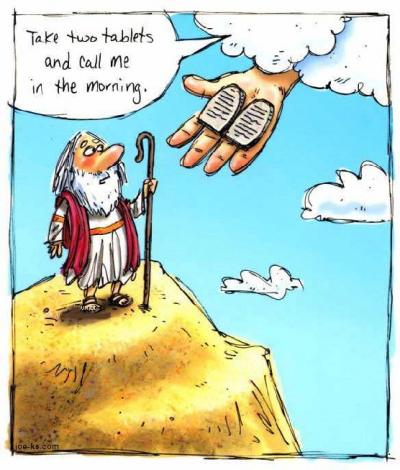

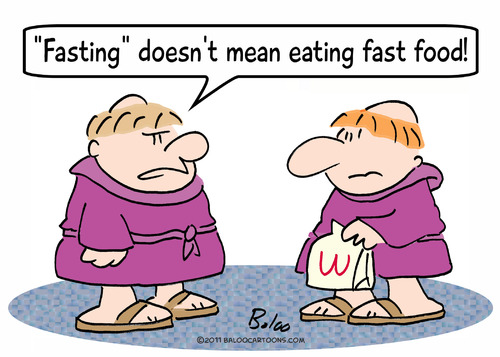
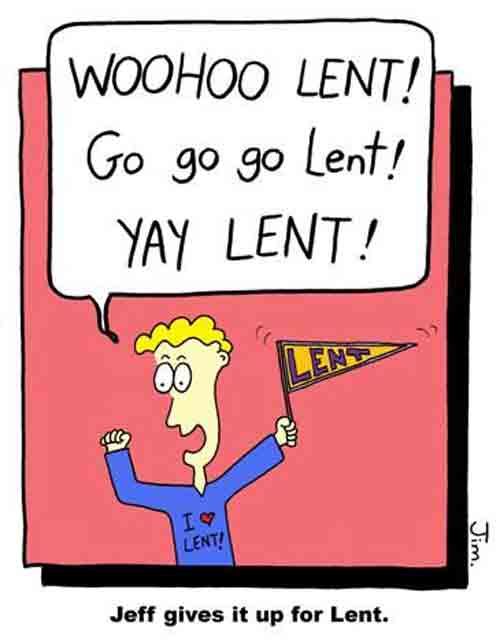


The 1983 Code of Canon Law suffers the defect of being promulgated by a Non-Pope with no authority to change or reform the previous Church Law? Also there could not have been valid and licit changes in the liturgical calendar of the Church, nor its Liturgy...or its canonized Saints?
All the actions of The Roman usurpers from John XXIII through Paul VI, John Paul II the Great Deceiver, Benedict and Francis have been invalid. The 1983 Code of Canon Law must be rejected as well as all of their canonizations and liturgical changes.

The Pope Speaks: March 2018
Lord Make Me A Saint
How many of can sincerely say this prayer? Before his conversion, Saint Augustine prayed: “Lord, give me chastity, but not yet.” What are we holding back from Almighty God? What would we insert in place of chastity in the above prayer? Saint Francis de Sales said: “Were I conscious of one fiber in my heart that did not belong to God, I would rip it out.” What are we refusing to rip out?
Everyone in heaven is a saint. We want to go to heaven, therefore we must also become saints. Purgatory is for those who do not quite make it to becoming a saint in this valley of tears. Let us not underestimate what it takes to be saved.
What Is A Saint?
We get a false idea of what a saint is, when we read some lives of the Saints. We read of miracles and visions and think that sanctity consists in these. But, consider Judas lived with Jesus and probably cast out demons and performed miracles in the name of Jesus. And yet, we fear he was lost. Saint Teresa had visions and locutions, and yet Jesus could show her the place that was prepared for her in hell. Yes, For almost two decades, Teresa of Avila refused to give up one little thing Jesus asked of her. After she gave it up, Jesus showed her the place she had been heading towards. And she was headed there while receiving extraordinary graces, such as visions and locutions, including the one in which Jesus asked of her this small sacrifice.
Then we read of the heroic penances some of the saints performed and consider that we can't do that, so we compromise with the world. Saint Paul wrote the Corinthians (I Corinthians 13:1-3): “If I speak with the tongues of men, and of angels, and have not charity, I am become as sounding brass, or a tinkling cymbal. And if I should have prophecy and should know all mysteries, and all knowledge, and if I should have all faith, so that I could remove mountains, and have not charity, I am nothing. And if I should distribute all my goods to feed the poor, and if I should deliver my body to be burned, and have not charity, it profiteth me nothing.” Unless God specifically asks us to do special penances and these are approved by our spiritual director, we are forbidden to do them. Sanctity does not consist in heroic penances.
Saint Alphonsus writes: “But, on the other hand, to be the result of obedience, is an infallible sign that an action is pleasing to God. Nicephorus relates that when the Superiors of St. Simon Stylites wished to ascertain whether the extraordinary and singular life which he led, remaining on a pillar in the open air, night and day, were pleasing to God, they commanded him to come down from his pillar and to live with the other monks. On hearing the command, the saint instantly stretched out his foot to descend, but was told by his Superiors to persevere in his austerities, which he proved by his obedience to be acceptable before God. It is necessary, then, to seek even holy things without attachment to self-will.”
And then we read of the tortures the martyrs underwent. Martyrdom is to suffer death in defense of virtue. And thus we have Saint Maria Goretti, who choose death over losing her virginity. Are we ready to suffer death in defense of virtue?
We should consider two other cases of martyrdom, because there is an important message there. First we have the forty martyrs of Sebaste. They were placed on a frozen lake to freeze to death. However, a hot bath was prepared, if any one wished to apostatize. One solider was watching them closely as they prayed through the night that God would preserve their number of forty to remain faithful. And yet, one could take it no longer and ran to warm in the hot bath. Soon, he breathed his last in that bath. The solider seeing the fortitude of the other thirty-nine declared himself a Christian and ran out to join the others on the lake. Soon forty entered heaven, the soldier taking the place of the one who apostatized.
And then there is the story of two men, Sapricius and Nicephorus. Sapricius had wronged Nicephorus, but soon thought better of it and sought to be reconciled. Nicephonrus refused for years to forgive Sapricius. And then up came a persecution and Nicephorus was taken prisoner and being led to execution. Sapricius made last try at reconciliation, but Nicephorus refused. When the final test was given to Nicephorus, he sacrificed to the idols and saved his life, losing the grace of martyrdom. This teaches us that to be ready for martyrdom, we must be living the Christian life fully, following the maxims of the Gospels.
We have been considering what a saint is not, rather than what a saint is. A saint is an ordinary person, who does ordinary things extraordinarily well. There are saints in all walks of life from the humblest to the most exalted. Basically a saint is totally conformed to the will of God. A saint is totally dead to self. Saint Paul said: “And I live, now not I; but Christ liveth in me.” (Galatians 2:20) Does Christ live within us?
How do we learn the will of God? Should we wait for a burning bush? Of course not, God is talking to us all of the time. Are we listening? Yes, God is talking to you right now.
We look first to the Ten Commandments, which teach us many things about how we should live. This is why we study them thoroughly in the catechism, which is another way God speaks to us. The Gospels are full of advice on how we should live our lives, which is why we should read from them daily, as well as other portions of Sacred Scripture. This leads to our spiritual reading, which is another way God speaks to us.
God speaks to us through the authorities He has placed over us. We look to our employer at work for direction on how to do our work. We look to the government in civil matters. Finally in spiritual matters we look to the Church, the Pope, the Bishop of our diocese and the Pastor of our parish. Our Pastor speaks to us in sermons. Our Confessor speaks to us in spiritual direction and in the Confessional. From the Church flow the Commandments of the Church, which is another way God speaks to us. Obedience is extremely important in the life of a Christian. “For obedience is better than sacrifices:” (I Kings 15:22) We can perform large penances, but if we are disobedient they are useless.
And God can speak to us in inspirations, which He sends to us throughout our lives. A thought pops into our head to do some good act. Do we discharge it immediately? Do we follow these inspirations?
Most saints find their way by simply doing the will of God day by day. And another way of fulfilling God's will is through the duties of our state of life. Does a mother with several small children think about whether or not she is doing the will of God? No, she simply tends to the children as needs arise, while trying to get her other work done.
Let us pray with sincerity: “Lord, make me a saint.”
Pope Michael

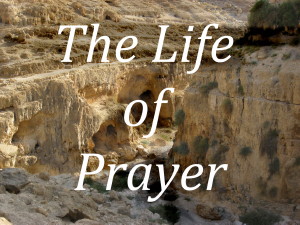
Dear soul, it is my joy to write to you again. I pray that you are having a fruitful Lenten season and that you are blessed with every needed grace.
Let us turn our minds once again to Evagrius as he gives us four further "chapters" on prayer. These chapters, dear soul, I think you will find to be somewhat blunt. This is a good thing. If there is one thing that making a good Lenten Fast will teach the soul, it is that the spiritual life has no need for speaking around in circles; no need for frills or frippery. During the Fast, we get down to the real business of spiritual life, and it is sometimes not at all what we may have expected.
That, too, is a good thing. Let us lay all things bare and let us examine our life under the light of supernatural grace.
Now, Lent and tears go together, dear soul. That is not to say that they are inseparable, or that there is something wrong with the Christian who does not shed tears during the prayer of the Lenten Fast. As we have learned, genuine tears are a gift of God, and God gives or does not give according as He wills. You can rest assured that He gives exactly what is needed where it is needed.
In the spirit of discernment, however, let us hear the plain words of Evagrius as he addresses the gift of genuine tears in the next two "chapters." Hear him well!
7. If you do shed tears during your prayer, do not exalt yourself, thinking you are better than others. For
your prayer has received help so that you can confess your sins readily and make your peace with the
Lord through your tears. Therefore do not turn the remedy for passions into a passion, and so again
provoke to anger Him who has given you this grace.
8. Many people, shedding tears for their sins, forget what tears are for, and so in their folly go astray.
Yes, dear soul, tears are meant not as an end in themselves, but rather are given as a help to urge us to repentance. If you are graced with the gift of tears, it is because God wishes so to soften your heart with them. Do not think yourself more blessed in this than one who does not shed tears in prayer, for it is perhaps that the one who does not weep already has a heart so like unto the that of the Saviour that he has no need of the softening action of the gift of tears. Attend, rather, to your own heart. Hasten to repentance! Tears are given you to make the way to penance that much easier to discern.
Evagrius continues:
9. Persevere with patience in your prayer, and repulse the cares and doubts that arise within you. They
disturb and trouble you, and so slacken the intensity of your prayer.
Here we see that the fruit of genuine tears is not found in doubts or in fears. Too often, one might mistake one's own tears of doubt, of frustration, or even of sorrow for the gift of holy tears. All can be turned into occasions of grace when offered unto God, this is a certainty. But one rejects the workings of grace who sheds tears over sin and yet does not resolve all the more to seek to do the will of God, and to do so not in a state of agitation, but in the state of blessed recollection. This leads us to the final "chapter" for this month, dear soul:
10. When the demons see you truly eager to pray, they suggest an imaginary need for various things,
and then stir up your remembrance of these things, inciting the intellect to go after them: and when it
fails to find them, it becomes very depressed and miserable. And when the intellect is at prayer, the
demons keep filling it with the thought of these things, so that it tries to discover more about them and
thus loses the fruitfulness of its prayer.
And here we see a deep trap which is laid for those who would pray, and one into which it is so easy to fall! How many times have each of us found ourselves there?
The one who sets about the life of prayer must cultivate a blessed dispassion in the intellect. That is, we must learn not to trust our own decision-making when it comes to matters of grace, but rather to trust the movements of God. In our intellect, we might have the inclination to think that we know best, that we know how a certain situation might play out.
All things are in God's hands, and the human will is a fickle thing. We must never become discouraged that the work of grace is met with seeming indifference or even outright hostility, especially among those who should know better. Abide, rather, in patience and in quiet with God. For how long - and how often - has God Himself put up with the folly of our own hearts? How long has God awaited our own conversion?
So likewise we must grow to be the same, to truly be like unto God. We do not know better than Almighty God Himself does. Let us rather do his holy will, and cultivate a genuine dispassion to all things which might be distracting from a fruitful life of faith.
And here I think we can leave the lessons for this month, dear soul. We have been given some blunt, heavy lessons to consider during this time of Lent. I think, though, that these lessons will serve us well.
Let us remember that all gifts are given to the glory of God and for the life of grace. Do not let the diversity of gifts be an occasion for pride, but rather for even greater working in grace. And finally, cultivate dispassion in the face of despondency by learning from the Lord Himself, Who is meek and humble of heart.


Books to feed your faith!

Saint Alphonsus Marie de Ligouri presents the proper method of preaching, that will move hearts to repentance and encourage people to live a virtuous way of life. The first chapter is devoted to this method of preaching, which is opposed to the showy method of many preachers of his day and even ours. Many seek to gain the praise of their listeners, rather than to bring them to repentance and educate them in the way of salvation. Saint Alphonsus, following the example of Saints Francis de Sales and Vincent de Paul sought to teach priests how to make saints and save souls rather than impress audiences. The second chapter refutes a critic. Saint Alphonsus begins by explaining the criticism: “My critic, you say, maintains that, though sacred orators should preach in a clear and orderly manner, they should never condescend to speak in a popular style; because, according to him, such a style is unworthy of the dignity of the pulpit and degrading to the word of God.” He then proceeds to defend his position and give further useful instructions to preachers.
Instructions For Preachers: Getting Your Message From the Pulpit to the Pew
$9.95
Instructions on Preaching: How to get Your message from the Pulpit to the Pew

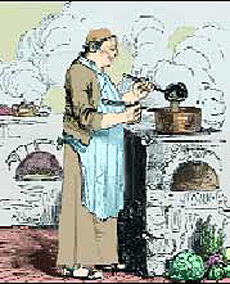
From the Monk's Kitchen
Arroz Rojo
A simple Lenten dish that goes well as a side or even as a main dish itself! If not using oil during Lent, you can dry-toast the rice in the pan, it will still turn out delicious!
2 cups rice
1 Tablespoon oil
1 garlic clove, diced
3 tomatoes, chopped
½ onion, chopped
4 cups vegetable broth
1 cups peas
2 carrots, chopped
1 chili pepper, chopped
Salt to taste
Add oil to a large pan on low heat.
Add rice and toast until golden.
Add garlic, tomatoes and onion; cook until mixture is soft.
Add the broth, peas, carrots, chili pepper and salt.
When it begins to boil, reduce the heat and cover until rice is fully cooked.
Enjoy!
Makes 4–6 servings


Video sermons and instructions: Oldies but goodies!
After Conversion
Gluttony
Curiosity


New! VIE Catholic Radio Network
We now have the VIE Catholic Radio Network online.
Is a 100% free internet radio station that depends on the gifts of its listeners. We don’t offer gimmicks or gadgets or promises of wealth and health… just all Catholic based radio, all the time.
It is through donations that The VIE Catholic radio Network can broadcast the Catholic faith to so many listeners around the world.
You can make a special financial contribution to help us at VIE Catholic Radio right now online. just go to the web site: VIEcatholicradio.com and under the donation tab you can make your online contribution or you can send checks or money orders to the address also given in the VIE Catholic Radio donation tab. We want to say thank you ahead of time for what you are able to give. As Matthew 10:8 says: "Freely have you received, freely give."
Listen to VIE Catholic Radio via your Android device with our new Android app! You can find it HERE at "Google Play".
The app is free of charge, although we have to pay a monthly fee for providing it.
We have had people from several countries who have listened and gave us some great feedback! So check it out at VIEcatholicradio.com.

Catechism Catch-Up
The Holy Spirit's Work in the Old Testament
The Holy Spirit's Work in the Old Testament
As we saw in our Catechism lesson, The Holy Spirit: At Creation, He first occurs in the second verse of the Bible, Genesis 1:2,and was actively involved in the creation of the earth.
Shortly thereafter in Genesis 6, the Holy Spirit is said to dwell in man. But because of their wickedness, God gave them 120 years to make things right, other wise, He said. "My spirit shall not remain in man for ever...." (Genesis 6:3)
In the closing books of the Old Testament, the Holy Spirit is frequently mentioned, that last clear reference being found in (Malachias/Malachi 2:15.) "Did not One make her, and she is the residue of His Spirit? And what doth one seek, but the seed of God? Keep then your spirit, and despise not the wife of thy youth."
Let us consider a number of the passages in which the Holy Spirit is mentioned. Let us look to the ways in which the Spirit worked in the days of the Old Testament.
THE HOLY SPIRIT AS THE SOURCE OF LIFE
In the beginning God created heaven, and earth. And the earth was void and empty, and darkness was upon the face of the deep; and the Spirit of God moved over the waters. (Genesis 1:1–2)
The Spirit of God made me, and the breath of the Almighty gave me life. (Job 33:4)
Thou shalt send forth thy spirit, and they shall be created: and thou shalt renew the face of the earth. (Psalm 103:30)
The Holy Spirit is described as creative, life-giving, and life-sustaining. Is it any wonder that in the New Testament He would be similarly described (John 3:5-8; 6:63; 2 Corinthians 3:6)?
THE HOLY SPIRIT LIVED WITH IN MEN:
At least before the Flood.
"My spirit shall not remain in man for ever...." (Genesis 6:3)
THE HOLY SPIRIT AS A TEACHER AND GUIDE
And thou gavest them thy good Spirit to teach them, and thy manna thou didst not withhold from their mouth, and thou gavest them water for their thirst.
And thou didst forbear with them for many years, and didst testify against them by thy Spirit by the hand of thy prophets: and they heard not, and thou didst deliver them into the hand of the people of the lands. (II Esdras/Nehemiah 9:20; 9:30)
Teach me to do thy will, for thou art my God. Thy good Spirit shall lead me into the right land:(Psalm 142:10)
THE HOLY SPIRIT AS THE MANIFESTATION OF GOD’S PRESENCE
Cast me not away from thy face; and take not thy Holy Spirit from me. (Psalm 50:13)
Whither shall I go from thy spirit? or whither shall I flee from thy face? (Psalm 138:7)
Yet now take courage, O Zorobabel, saith the Lord, and take courage, O Jesus the son of Josedec the high priest, and take courage, all ye people of the land, saith the Lord of hosts: and perform (for I am with you, saith the Lord of hosts) The word that I covenanted with you when you came out of the land of Egypt: and my spirit shall be in the midst of you: fear not. (Aggeus/Haggai 2:5-6).
THE HOLY SPIRIT FILLED AND EMPOWERED MEN IN THE OLD TESTAMENT
A. CRAFTSMEN, ARTISTS, DESIGNERS, BUILDERS:
Bezalel (and others, involved with tabernacle furnishings):
And I have filled him with the Spirit of God, with wisdom and understanding, and knowledge in all manner of work. (Exodus 31:3).
And Moses said to the children of Israel: Behold the Lord hath called by name Beseleel the son of Uri the son of Hur of the tribe of Juda. And hath filled him with the Spirit of God, with wisdom and understanding and knowledge and all learning. To devise and to work in gold and silver and brass, and in engraving stones, and in carpenters' work. Whatsoever can be devised artificially, he hath given in his heart: Ooliab also the son of Achisamech of the tribe of Dan: Both of them hath he instructed with wisdom, to do carpenters' work and tapestry, and embroidery in blue and purple, and scarlet twice dyed, and fine linen, and to weave all things, and to invent all new things. Beseleel, therefore, and Ooliab, and every wise man, to whom the Lord gave wisdom and understanding, to know how to work artificially, made the things that are necessary for the uses of the sanctuary, and which the Lord commanded. (Exodus 35:30–36:1).
B. ADMINISTRATORS AND LEADERS (INCLUDING KINGS):
Joseph:
And he said to them: Can we find such another man, that is full of the Spirit of God? (Genesis 41:38)
Moses and the 70 Elders who help him:
That I may come down and speak with thee: and I will take of thy spirit, (refering to the Holy Spirit that God had given Moses) and will give to them, that they may bear with thee the burden of the people, and thou mayest not be burthened alone. And the Lord came down in a cloud, and spoke to him, taking away of the spirit that was in Moses, and giving to the seventy men. And when the Spirit had rested on them they prophesied, nor did they cease afterwards. Now there remained in the camp two of the men, of whom one was called Eldad, and the other Medad, upon whom the Spirit rested; for they also had been enrolled, but were not gone forth to the tabernacle. And when they prophesied in the camp, there ran a young man, and told Moses, saying: Eldad and Medad prophesy in the camp. Forthwith Josue the son of Nun, the minister of Moses, and chosen out of many, said: My lord Moses forbid them. But he said: Why hast thou emulation for me? O that all the people might prophesy, and that the Lord would give them his Spirit! (Numbers 11:17, 25-29).
Joshua:
And the Lord said to him: Take Josue the son of Nun, a man in whom is the Spirit, and put thy hand upon him. (Numbers 27:18).
And Josue the son of Nun was filled with the spirit of wisdom, because Moses had laid his hands upon him. And the children of Israel obeyed him, and did as the Lord commanded Moses.(Deuteronomy 34:9).
Saul:
And the Spirit of the Lord shall come upon thee, and thou shalt prophesy with them, and shalt be changed into another man. When therefore these signs shall happen to thee, do whatsoever thy hand shall find, for the Lord is with thee. (1 Kings/1 Samuel 10:6-7)
And they came to the foresaid hill, and behold a company of prophets met him: and the Spirit of the Lord came upon him, and he prophesied in the midst of them. (1 Kings /1 Samuel 10:10).
And the Spirit of the Lord came upon Saul, when he had heard these words, and his anger was exceedingly kindled. (1 Kings / 1 Samuel)11:6).
Saul and his men—preventing them from doing harm to David, God’s anointed:
But David fled and escaped, and came to Samuel in Ramatha, and told him all that Saul had done to him: and he and Samuel went and dwelt in Najoth. And it was told Saul by some, saying: Behold David is in Najoth in Ramatha. So Saul sent officers to take David: and when they saw a company of prophets prophesying, and Samuel presiding over them, the Spirit of the Lord came also upon them, and they likewise began to prophesy. And when this was told Saul, he sent other messengers: but they also prophesied. And again Saul sent messengers the third time: and they prophesied also. And Saul being exceedingly angry, Went also himself to Ramatha, and came as far as the great cistern, which is in Socho, and he asked, and said: In what place are Samuel and David? And it was told him: Behold they are in Najoth in Ramatha. And he went to Najoth in Ramatha, and the Spirit of the Lord came upon him also, and he went on, and prophesied till he came to Najoth in Ramatha. And he stripped himself also of his garments, and prophesied with the rest before Samuel, and lay down naked all that day and night. This gave occasion to a proverb: What! is Saul too among the prophets? (1 Kings/1 Samuel 19:18-24).
David:
Then Samuel took the horn of oil, and anointed him in the midst of his brethren: and the Spirit of the Lord came upon David from that day forward: and Samuel rose up, and went to Ramatha. But the spirit of the Lord departed from Saul, and an evil spirit from the Lord troubled him. (1 Kings /1 Samuel 16:13-14).
The Spirit of the Lord hath spoken by me and his word by my tongue.(2 Kings /2 Samuel 23:2; cf. also Acts 1:16; 4:25)
C. THE JUDGES OF ISRAEL:
Othniel:
And the Spirit of the Lord was in him, and he judged Israel. And he went out to fight, and the Lord delivered into his hands Chusan Rasathaim king of Syria, and he overthrew him. (Judges 3:10)
Gideon:
But the Spirit of the Lord came upon Gedeon, and be sounded the trumpet and called together the house of Abiezer, to follow him. (Judges 6:34)
Jephthah:
Therefore the Spirit of the Lord came upon Jephte, and going round Galaad, and Manasses, and Maspha of Galaad, and passing over from thence to the children of Ammon, (Judges 11:29).
Samson:
And the Spirit of the Lord began to be with him in the camp of Dan, between Saraa and Esthaol.(Judges 13:25).
And the Spirit of the Lord came upon Samson, and he tore the lion as he would have torn a kid in pieces, having nothing at all in his hand: and he would not tell this to his father and mother....And the Spirit of the Lord came upon him, and he went down to Ascalon, and slew there thirty men, whose garments he took away and gave to them that had declared the riddle. And being exceeding angry he went up to his father' s house: (Judges 14:6, 19).
Now when he was come to the place of the Jawbone, and the Philistines shouting went to meet him, the Spirit of the Lord came strongly upon him: and as the flax is wont to be consumed at the approach of fire, so the bands with which he was bound were broken and loosed. (Judges 15:14)
D. THE PROPHETS:
Balaam:
And lifting up his eyes, he saw Israel abiding in their tents by their tribes: and the Spirit of God rushing upon him, (Numbers 24:2)
Elijah and Elisha:
And when I am gone from thee, the spirit of the Lord will carry thee into a place that I know not: and I shall go in and tell Achab, and he not finding thee, will kill me: but thy servant feareth the Lord from his infancy. (III Kings/I Kings 18:12).
And when they were gone over, Elias said to Eliseus: Ask what thou wilt have me to do for thee, before I be taken away from thee. And Eliseus said: I beseech thee that in me may be thy double Spirit...... And he took up the mantle of Elias, that fell from him: and going back, he stood upon the bank of the Jordan, And he struck the waters with the mantle of Elias, that had fallen from him, and they were not divided. And he said: Where is now the God of Elias? And he struck the waters, and they were divided, hither and thither, and Eliseus passed over. And the sons of the prophets at Jericho, who were over against him, seeing it said: The Spirit of Elias hath rested upon Eliseus. And coming to meet him, they worshipped him, falling to the ground, (IV Kings/ II Kings 2:9, 13-15).
Isaiah:
Come ye near unto me, and hear this: I have not spoken in secret from the beginning: from the time before it was done, I was there, and now the Lord God hath sent me, and his Spirit. Thus saith the Lord thy redeemer, the Holy One of Israel: I am the Lord thy God that teach thee profitable things, that govern thee in the way that thou walkest. (Isaias/Isaiah 48:16-17).
Ezekiel:
This was the vision of the likeness of the glory of the Lord. And I saw, and I fell upon my face, and I heard the voice of one that spoke. And he said to me: Son of man, stand upon thy feet, and I will speak to thee. And the Spirit entered into me after that he spoke to me, and he set me upon my feet: and I heard him speaking to me, And saying: Son of man, I send thee to the children of Israel, to a rebellious people, that hath revolted from me, they, and their fathers, have transgressed my covenant even unto this day. (Ezechiel/Ezekiel 2:1-3; cf. also 3:12, 14, 24; 11:1, 5, 24; 13:3; 43:5).
Daniel:
Till their colleague Daniel came in before me, whose name is Baltassar, according to the name of my god, who hath in him the spirit of the holy gods: and I told the dream before him. Baltassar, according to the name of my god: He says this, because the name of Baltassar, or Belteshazzar, is derived from the name of Bel, the chief god of the Babylonians. Baltassar, prince of the diviners, because I know that thou hast in thee the spirit of the holy gods, and that no secret is impossible to thee: tell me the visions of my dreams that I have seen, and the interpretation of them. (Daniel 4:5-6 Douay Rheims).
I king Nabuchodonosor saw this dream: thou, therefore, O Baltassar, tell me quickly the interpretation: for all the wise men of my kingdom are not able to declare the meaning of it to me: but thou art able, because the spirit of the holy gods is in thee. (Daniel 4:15 Douay Rheims).
There is a man in thy kingdom that hath the spirit of the holy gods in him: and in the days of thy father knowledge and wisdom were found in him: for king Nabuchodonosor thy father appointed him prince of the wise men, enchanters, Chaldeans, and soothsayers, thy father, I say, O king:(Daniel 5:11).
St. Cyril recognizes recognizes that the spirit Belteshazzar mentions is actually the Holy Spirit.
Micah:
But yet I am filled with the strength of the Spirit of the Lord, with judgment, and power: to declare unto Jacob his wickedness, and to Israel his sin.(Micheas/Micah 3:8).
E. OTHERS, WHO SPOKE TO MEN FOR GOD:
Amasai:
But the Spirit came upon Amasai the chief among thirty, and he said: We are thine, O David, and for thee, O son of Isai: peace, peace be to thee, and peace to thy helpers. For thy God helpeth thee. So David received them, and made them captains of the band. (1 Paralipomenon/1 Chronicles 12:18).
Azariah:
And the Spirit of God came upon Azarias the son of Oded, (2 Paralipomenon/2 Chronicles 15:1).
Jehaziel:
And Jahaziel the son of Zacharias, the son of Banaias, the son of Jehiel, the son of Mathanias, a Levite of the sons of Asaph, was there, upon whom the Spirit of the Lord came in the midst of the multitude, (2 Paralipomenon/2 Chronicles 20:14).
Zechariah:
The Spirit of God then came upon Zacharias the son of Joiada the priest, and he stood in the sight of the people, and said to them: Thus saith the Lord God: Why transgress you the commandment of the Lord which will not be for your good, and have forsaken the Lord, to make him forsake you? (2 Paralipomenon/2 Chronicles 24:20).
THE OLD TESTAMENT MINISTRY OF THE HOLY SPIRIT
The first thing we should note is that the term, “Holy Spirit,” seldom occurs in the Old Testament. Actually it is found only one time in Psalm 50:13. The most frequently used terms or expressions for the Holy Spirit in the Old Testament are:
- the Spirit of the Lord
- my Spirit
- the Spirit
- the Spirit of God
- the spirit of … (Judgment, fire, justice, etc.)
- your Spirit
In nearly all of these cases, the reference to the Holy Spirit is clear, although there are some instances where the Holy Spirit and the human “spirit” seem almost to merge, so that the Holy Spirit is referred to as the “Spirit of Elijah” (cf. IV Kings /II Kings 2:9-15). This is also the case with the “Spirit” which was on Moses, which also came upon the seventy elders who were to help him (Numbers 11:17-29).
Regardless of the infrequency of the precise term, “Holy Spirit,” the person and work of the Holy Spirit in the Old Testament times is much more prominent than one would suppose, apart from a consideration of the many texts referring to Him. The Spirit of God is almost immediately introduced in the Book of Genesis (1:2), and He becomes a frequent focus in the writings of the prophets. The Holy Spirit had a significant role in the creation of the world (Genesis 1:2). He inspired men who revealed God to men, either in word, or in work. He instructed and guided men, especially the nation Israel. The Spirit of God instructed and guided not only the nation Israel as a whole, but men individually (e.g. David, I Kings/1 Samuel 16:13-14; Psalm 142:10). He enabled and empowered men to do that which was humanly impossible (e.g., the judges of Israel). He manifested not only the power of God through men (Isaiah 63:10-14) but the presence of God among men (Psalm 52:11; 138:7; Aggeus/Haggai 2:4-5). It seems as well that the Holy Spirit was the instrument through whom the glory of God was manifested (cf. Aggeus /Haggai 2:3-9).
The Holy Spirit therefore appears to be the agency through which God most often worked. God used men to reveal His will and His word (e.g. the prophets), but these men were inspired and empowered by the Holy Spirit so that the words they spoke were clearly the “Word of the Lord.” When men spoke in the Spirit, they spoke for God. When men disobeyed the Word of God, they were regarded as having not only resisted God, but His Spirit as well (Esdras /Nehemiah 9:20, 30; Psalm 105:33; Isaias/Isaiah 30:1-2; 63:10-14; Zacharias/Zechariah 7:11-12).
One of the Holy Spirit’s tasks was to accomplish divine communication from God to men, such as the empowering of the prophets. Another task was an illuminating and teaching ministry which enabled men to understand that which God had revealed in the Scriptures. David, in the psalms, seems to be especially sensitive to this ministry. Thus, when he prays that God would “open his eyes” to behold wondrous things from God’s law (Psalm 118:18), I believe he was praying for the teaching and illuminating ministry of the Holy Spirit.
...Thus the Lord, the Holy Spirit, must be entreated by us to remove every cloud and all darkness that obscures the vision of our hearts hardened with the stains of sins in order that we may be able to behold the spiritual and wonderful knowledge of the law, according to him who said, "Take the veil from my eyes, and I shall observe the wonders of your law"-Origen
When the people of Israel willfully turned their backs on God and rebelled against His Word, they grieved His Holy Spirit. As a result, as I understand it, the Spirit ceased to illumine them to the meaning of the law, except through the prophets, from time to time. Men ceased to read God’s law in terms of its “spirit” (conveyed by the Spirit), but rather in terms only of its “letter.” It is no wonder that the kinds of interpretation we see the Jewish religious leaders holding in the Gospels was the order of the day. The Savior’s teaching in the Sermon on the Mount was not the overturning of the Law (which He came to fulfill, not to put away), but the interpretation of the Law as God had always intended it—in terms of its spirit, and not just of its letter (cf. 2 Corinthians 3:6). Unbelief and disobedience led to a perversion of the Word of God, because the teaching of the Spirit ceased when He was grieved.
When I consider the ministry of the Holy Spirit in the Old Testament, I am taken aback by the prominence of the third person of the Trinity. While the Spirit of God may not be clearly distinguished from God, so that the doctrine of the Trinity was crystal clear, He is described as being God, and as the agency which God used to accomplish His purposes in the world. The frequency of the references to the Holy Spirit is much greater than I expected and the extent of His ministry much broader.

Living Catholic

How Would You Advise...? Part III
I have four illustrations with four essential questions that should be asked for each illustration. This is illustration 3.
Illustration III:
A teenager has been slipping out of her house every Sunday evening to attend a nearby Catholic church youth meeting. She knows her mother would be angry if she found out that her daughter was going to this church, so she had had to do it secretly. The daughter feels that the activities at this Catholic church are a great help to her.
Should she continue secretly attending the Catholic Church? Or should she stop attending if her mother objects?
First Essential Question: Did They Have Mature Attitudes?
The teenager who began to secretly attend a near-by- Catholic Church had previously developed the attitudes of rebellion and self-will toward her mother. By responding properly to her mother, she would allow her mother to see that her old attitudes had changed as a result of attending the church, and she would be advancing the most powerful encouragement as to why her mother should allow her to continue attending the church.
2nd Essential Question: Did They Discern Basic Intentions?
The basic intentions of the teenagers mother were not to stop the girl from going to church but to develop obedience toward her parents. This obedience involved assuming responsibilities around the home rather than "running off all the time." the mother observed that some of the friends her daughter had met at this church were not obeying their parents and also condemned their parents for not being as "spiritual" as they were. She did not want her daughter to develop these attitudes.
3rd Essential Question: Did They Design Creative Alternatives?
Alternative For The Teen-Age Girl Were:
- Ask forgiveness of her mother for past attitudes and actions which were wrong.
- Commit her mother to the Lord prior to asking if she could attend the youth group, with the understanding that the Lord is able to speak to her through her mother.
- Determine ahead of time that she would silently thank the Lord for whatever decision her mother gave and continue to develop right attitudes in the home.
4th Essential Question: Did They Give God Time to Work In Changing Decisions?
The Teen-age girl agreed in prayer that she would willingly accept and thank the Lord for whatever answer her mother gave her. When she asked her mother if she could go to the youth group, her mother became extremely angry and said, "No. You can't go to that youth meeting! I want you to stay home tonight!" The girl gracious response was, "Is there something you would like me to do around the house tonight?" This response shocked her mother. In unbelief she commented, "Yes, Get out in the the kitchen and do the dishes.!"
The girl cheerfully began the project. Before she had finished, her mmother came into the kitchen and gruffly asked, "Do you have your homework done for tomorrow?" The daughter replie that it was completed. Minutes later, her mother returned to the kitchen and said, "Since you've done the dishes and your homework, I guess you can go to that meeting tonight; but make sure you're home by nine o'clock!"
The heart of the king ( a nations authority) are in Gods hand to direct. Parents hearts (the family authority) is also in Gods hand to direct.
As the divisions of waters, so the heart of the king is in the hand of the Lord: whither soever he will he shall turn it. (Proverbs 21:1)
When the ways of man shall please the Lord, he will convert even his enemies to peace. ( Proverbs 16:7)
God is not as nearly concerned with what we go through as He is with our response to what we go through. In all that He designs or allows us to experience, His chief concern is that oyur attitudes become consistent with those of His son, Jesus Christ. He was subject to the authority of His parents as He was growing up.
And whereas indeed he was the Son of God, he learned obedience by the things which he suffered: (Hebrews 5:8)
I understand that this illustration is an illustration of a perfect world. So remember each situation will be a bit different, but the questions that should be asked would still apply. The key to all of this is that when you have a difficult situation like this it is so very important for prayers and fasting, asking for Gods direction and His will in the matter.
No Matter how inconsistent or unfair those in authority may be, we are responsible for our responses to them. God can use those who are hardest to get along with to motivate us to develop mature attitudes.


-
Pray for Frater Francis Dominic as he teaches Catechism through the web site. We are still working on our new Website where people can listen or watch Catechism lessons, take tests, and get a certificate of completion. It will take a long time to finish it but you can see the work that we are doing and we will keep you updated on when it is completed. Check out all of the construction going on over there at Traditional Catechism.com
-
God is calling men to come fully into His service with us here at the Vatican in Exile. It will be a life of self sacrifice. And so we ask all to pray for these men, that they will surrender to this calling and also have the fortitude to undertake this sacred calling.
- Please keep the VIE Radio Network in your prayers. The listener base is growing! Head on over to the site and let's keep getting the good news out!
- Frater Francis has some material needs of his own. He is in need of two Cassocks and a suit. He will be out in the public a lot more visiting hospitals, counseling, Jail visits, doing funerals and weddings etc.
- Keep His Holiness also in your prayers. He has taken on a three day job helping a lady with disability by cooking for her and taking her to her doctors and the grocery store. The extra money is such a blessing. But the reality is that there are many who could be giving at least $10.00 a month to support the Church and are not giving. We are thankful for Gods provisions but pray that the people of God will start supporting the Church. Thank God for the faithful who do.
So as we say every month we are very close with our budget. It takes money to be available to people in other areas as well as having supplies like rosaries, bibles, pamphlets, Catechisms etc. for sharing with Non Catholics. At this time to stay comfortably out of the red we need 700.00 a month. Please read the message Giving to God's Work and then decide how you can give. Everyone should give something. It does not have to be much.


To Donate online go to:

To Donate by Mail:
Our address is
Vatican in Exile
829 NE Chester
Topeka, Kansas 66616
Make Checks payable to:
Vatican in Exile






 Follow
Follow


